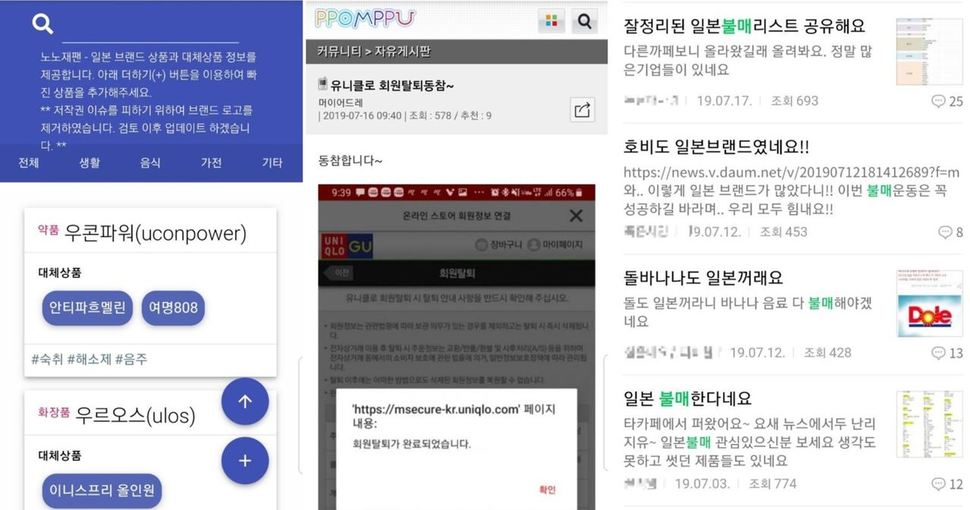 |
|
From the left: A screenshot of Nonojapan.com; a photo posted by a South Korean proving cancellation of membership with a Japanese brand; and a posting regarding a nationwide boycott of Japanese products.
|
Others worry about negative impact on small businesses in Korea
The South Korean public’s boycott of Japanese products in response to the Japanese government’s imposition of export controls is playing out in a range of formats, both online and offline. Websites that offer tips about products that can replace the Japanese products being boycotted are gaining popularity; communities for traveling to Japan are shutting down, and single-person protests are being organized. One of the search terms trending on an online portal on the morning of July 18 was “NoNoJapan.com,” a website that suggests alternatives to Japanese products that many Koreans are boycotting. As the term rose to the top of the list, visitors congregated to the site, and its server had trouble handling the increasing traffic. NoNoJapan provides information not only about well-known Japanese brands such as fashion brand Uniqlo and everyday product brand Muji but also about those that aren’t as widely recognized as Japanese, including cosmetics brand Ul-Os, laundry detergent brand Beat, and wristwatch brand Rosemont. The site also encourages crowd-sourcing, enabling visitors to add information about other products by clicking on the plus icon on the bottom-right corner of the page. Netizens approve of the convenience of the website, which not only clarifies which products are Japanese but also provides recommendations for Korean-made alternatives. On July 17, an internet community called Neildong announced it was temporarily shutting down. With more than 1.33 million members, Neildong is South Korea’s largest community focused on traveling to Japan. In effect, the community has joined in the boycott by going inactive. “I think the site will be inactive for quite some time. Japan’s House of Councillors election is coming up on July 21, and prior to that, I wanted to express the feelings of [Koreans] who like traveling in Japan. I thought it would be better to do something instead of waiting until after the election to speak up or letting this opportunity pass by,” wrote the admin at Neildong in a public announcement posted to the community. Lists of Japanese products are being shared in online communities and on social media, while users are posting photographic proof that they’ve canceled their membership in Japanese brands. The brand that’s dealing with the most defections is Uniqlo, after its chief financial officer enraged Korean consumers by saying that the boycott “won’t last long enough to impact our long-term sales.” One netizen posted a screenshot of their membership cancellation with the following note: “I took a moment at lunch to cancel my membership — I was afraid I might forget about all this and start buying from them again later.” More people have said they’ll come out this weekend to take part in the single-person protest that a handful of people kicked off in front of the Uniqlo in Daegu on July 6. Protesters holding homemade placards are planning to take turns protesting between 1 and 6 pm in front of the Uniqlo branch on Dongseong Street, Daegu’s biggest shopping area. Public opinion polls also confirm that the boycott is spreading. When RealMeter polled 503 adult males and females around the country about the boycott of Japanese products, 54.6% of respondents said they were participating in the boycott, up 6.6 points from the previous week. Conducted on July 17, the poll had a reliability of 95% with a sample error of ±4.4 points. But some are raising concerns that the boycott could cause problems for small business owners in South Korea. Such concerns were evident in a message on an online community for mothers that was posted by the owner of a convenience store operated under a Japanese franchise. “Somehow I ended up running a convenience store, and it just happened to be ‘that brand.’ For a few months after buying in, sales were strong, and I was getting more regular customers. But over the past week, sales have tanked. It’s frustrating, because I’ve got to make a living, and this is my livelihood,” the writer said. “Though I’ve been taking part in the boycott, I’ve also been worried that small business owners are going to suffer in the end,” one member of the community opined. “It seems like it’s just the self-employed who are losing out,” another wrote. By Kim Min-je, staff reporter, and Kim Il-woo, Daegu correspondent Please direct comments or questions to [english@hani.co.kr]






